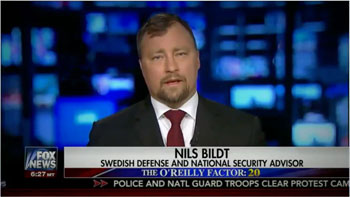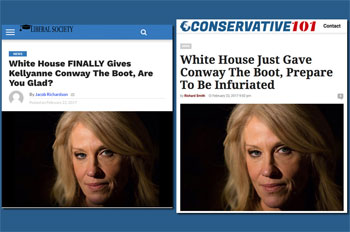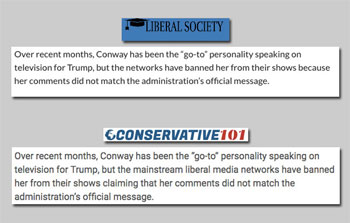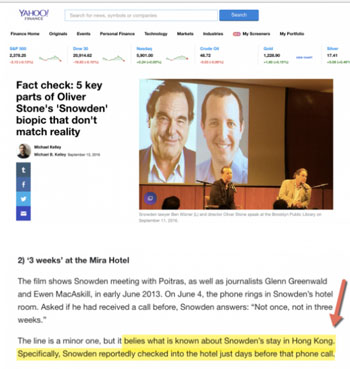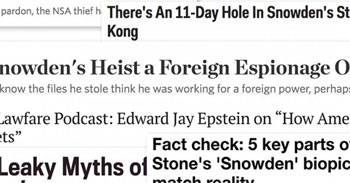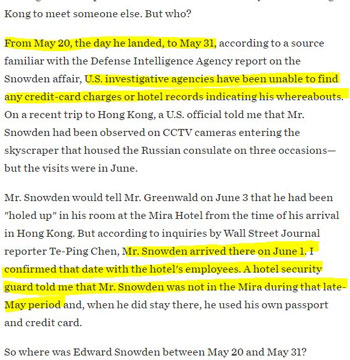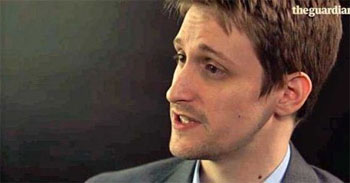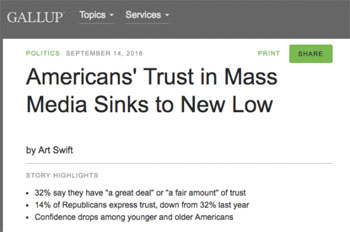Re: Washington Post’s ‘Fake News’ Guilt, by Robert Parry
Glenn Greenwald: Mainstream U.S. media is culpable for disseminating fake & deceitful news on Russia. "Any story that bolsters the prevailing D.C. orthodoxy on the Russia Threat, no matter how dubious, is spread far and wide."
by Amy Goodman
January 5, 2017
NOTICE: THIS WORK MAY BE PROTECTED BY COPYRIGHT
We are joined by Glenn Greenwald, Pulitzer Prize-winning journalist and one of the founding editors of The Intercept. His latest article is headlined “WashPost Is Richly Rewarded for False News About Russia Threat While Public Is Deceived.” In it, he writes, “Any story that bolsters the prevailing D.C. orthodoxy on the Russia Threat, no matter how dubious, is spread far and wide. And then, as has happened so often, when the story turns out to be false or misleading, little or nothing is done to correct the deceitful effects.”
TRANSCRIPT: This is a rush transcript. Copy may not be in its final form.
NERMEEN SHAIKH: We’re talking about WikiLeaks founder Julian Assange and allegations of Russian cyber-attacks. During his interview with Fox News’ Sean Hannity this week, Assange was asked whether mainstream media in the U.S. is dishonest.
AMY GOODMAN: That’s WikiLeaks founder Julian Assange on Fox News. Glenn Greenwald, your latest article for The Intercept is headlined “WashPost Is Richly Rewarded for False News About Russia Threat While Public Is Deceived.” So, could you comment on what Assange said and your own findings regarding mainstream media coverage of alleged Russian cyber-attacks?
GLENN GREENWALD: So let’s focus on the extraordinary behavior of The Washington Post for the moment. They have produced two of the most humiliating debacles in American journalism over the last several years. And these two humiliations have taken place just within the last six weeks, both of which were about completely fictitious and fabricated claims about the threat posed by Vladimir Putin and Russia.
The first was on November 24th, when they claimed, based on a newly formed anonymous group, that there has been a very widespread, successful effort to implant Kremlin propaganda in the American discourse. And they accomplish this by giving credence to this secret list that this anonymous group of cowards had created in which they claim that a whole range of American media outlets and websites, such as the Drudge Report and other libertarian critics of Hillary Clinton on the right and long-standing left-wing critics of the Democratic Party, like Naked Capitalism and Truthout and Truthdig on the left – they decree them to be tools of Kremlin propaganda. And The Washington Post created this huge story, that went all over the place, based upon giving credence to this list and saying that Russian propaganda had been viewed more than 200 million times in the United States. Journalists all over Twitter, throughout the American media, mindlessly spread it, aggressively endorsed it. It became a huge story. And over the course of the next two weeks, the story completely collapsed, and there’s now a major editor’s note at the top of the article disclaiming the key source, saying that they did not intend to in any way vouch for the validity of the findings of the source on which the entire story was based.
But even more embarrassing was this weekend, when the Post trumpeted this story on Friday night that Vladimir Putin and Russia had hacked into the electric grid of the United States through a Vermont utility, which caused Vermont officials like the governor and Senator Pat Leahy to issue statements saying Vladimir Putin is trying to endanger the safety and the welfare of Vermonters by stealing their heat in the winter. The whole story, from start to finish, turned out to be a complete fabrication. There was no invasion of the American electric grid. The malware that was found on one laptop had nothing to do with Russia. The story was completely false. And again, the American media, in this hysteria, kept spreading and endorsing it.
And in both cases, the retractions were barely noted. So you have millions of people being misled into this hysteria, into this view that Russia is this grave threat, and when the story journalistically collapses, they barely hear about it. And it happened over and over through the election, with Slate saying that a secret server had been found between Donald Trump and a Russian bank, which turned out to be completely false. The Post aired allegations that Putin had poisoned Hillary Clinton on the day that she collapsed on 9/11. And so, it’s not really just dishonesty. It’s the kind of behavior we saw in 2002, where American media outlets are willing to publish anything that the U.S. government tells them to publish, to inflate and expand the threat posed by Russia, to raise fear levels to the highest possible degree. And it’s an incredibly irresponsible and dangerous form of behavior that media outlets, led by The Washington Post, are engaging in.
AMY GOODMAN: And you talk about how retractions obviously don’t get anything like the play of the story, that also has to do with what’s tweeted by the publication, even when they retract, and what isn’t, Glenn.
GLENN GREENWALD: Right. So let me just give you two examples of just the corruption that’s at play here. So, when the Post unveiled their huge story about Russia fake news based on this McCarthyite list that has been proven to be a fraud, they had Marty Baron, the executive editor, the widely respected executive editor of the paper, go onto Twitter and announce this huge exposé. And predictably, it got tweeted and retweeted and shared thousands and thousands of times by all of the biggest journalists with the biggest social media followings. When the story collapsed over the next two weeks and they appended this huge editor’s note, The Washington Post did nothing to bring anyone’s attention to the fact that the key claims of the story have been gutted. Marty Baron refused to answer any questions over that two weeks about what the paper did, and he uttered not one syllable on Twitter or anywhere else to tell all the followers that he alerted to this story that the story had collapsed.
With the story that I just talked about over the weekend of the – of how Putin had wanted to steal the heat from Vermonters to make them suffer in the winter, Brent Staples, who works for The New York Times editorial page, went on Twitter and said, “Our friend Putin has invaded the U.S. electric grid.” And when that story collapsed and The Washington Post retracted it, he did something even worse: He just went and quietly deleted his tweet a day later, as though it never happened, and also failed to tell his 30,000 followers that what he had just told them the day before, that caused them to run around and share with all their friends on Facebook and Twitter that this has happened, was in fact a complete fiction.
And you see this over and over and over again. And remember, these are the people who keep saying that fake news is a huge problem, that Facebook has to suppress it. And yet it’s America’s leading journalistic outlets that are doing more to disseminate false and deceitful stories than Macedonian teenagers by a huge amount. And when they do it and it turns out that the stories are discredited, they take very little to no steps to alert the people that they’ve misled about the fact that the stories were false. And it’s incredibly reckless journalistically. And these are the same people pretending to be crusaders against fake news, who are themselves disseminating it more aggressively than anyone else.
NERMEEN SHAIKH: Well, Glenn Greenwald, let me ask you about the possible use of Twitter for the dissemination of other kinds of possibly fake information. You’ve repeatedly emphasized, as you just did, the role of Twitter in spreading false news by news media outlets. But this may be the first time in global history that a head of state, and that, too, of the most powerful state in the world, seems likely to use precisely this medium as one of his principal modes of communication. Do you think there are similar risks involved with official pronouncement conveyed through Twitter as you say and have explained are with journalistic use of this medium?
GLENN GREENWALD: So I think there are two sides to this. One is, there’s a potential – a potential virtue to having politicians being able to communicate directly to their constituents and the people they represent without having to be mediated by American media outlets, especially ones that have proven to be untrustworthy. So, in some sense, I actually think it’s positive, under the right circumstances, for a political leader – not Donald Trump, but just for political officials generally – to have a means to communicate directly to the people who they’re supposed to be representing and who can then hear feedback back from those people. I mean, in theory, that would be a good model.
The problem with Donald Trump using this is twofold. One is that when you’re the actual president of the world’s largest superpower with a massive nuclear arsenal, using Twitter is an extremely dangerous venue because it inherently has all kinds of ambiguities and possibilities for being misunderstood and for misleading people into what your actual intentions are. And that has happened over and over, where so many of his tweets are not even susceptible to reasoned discourse, where you don’t even know what he means. And when a president is issuing those kinds of ambiguous statements, those are the kinds of things that can ratchet up tensions unintentionally and even spark wars.
But I think there’s another sort of more pernicious aspect to it, which is what Trump is doing is he’s trying to discredit every single source of information other than Donald Trump. So, he’s telling his followers, “Don’t listen to the American media, because they’re liars.” He’s telling them, “Don’t listen to the intelligence community, because they defrauded you with Iraq.” He’s telling them, “Don’t listen to experts, because these experts are all corrupted and they’re part of the D.C. swamp,” that he wants to drain. “The only truth that you should trust comes from me, Donald Trump.” And that is a very dangerous framework. It’s pure authoritarianism when a political leader also becomes the only source of information that the population trusts. But, unfortunately, his biggest allies in that are media outlets who have done the kinds of things that I just explained The Washington Post having done and journalists having helped them. They’re the reason why people are losing faith in American media outlets. And that’s what gives space to a demagogue like Donald Trump to say, “I’m the only person who you can trust.” And his use of Twitter is really a weapon, a powerful weapon, in achieving that dangerous state of affairs.
AMY GOODMAN: China’s state news agency Xinhua said, “Twitter should not become an instrument of foreign policy,” warning President-elect Trump. But, Glenn, as we wrap up, your concerns right now? In the headline, we just said that Donald Trump says he’s going to overhaul the intelligence agencies, which many might think is a good thing, cutting back Virginia, the headquarters, less computer internet surveillance, more human surveillance, getting more spies out on the streets. Where is this country going now, Glenn? Your perspective, from outside now, though as an American?
GLENN GREENWALD: I mean, I think it really remains to be seen, but there are definitely fundamental changes taking place. If you look, for example, at recent polling, what you find is that the CIA is now one of the most admired and defended institutions among Democrats, while Republicans don’t like the CIA and actually prefer Vladimir Putin even to Barack Obama. You have radical shifts taking place in coalitions, in alliances, in alignments, and it can – it’s very unpredictable how it can play out. Sometimes instability could produce positive outcomes. Trump abrogated the TPP. He wants to limit Boeing and Lockheed and the amount of money that’s spent on them. He wants to bring jobs back to the U.S. But it can also have very dangerous outcomes, as well, because of its unpredictability. And so, I think it’s a very dangerous time for the United States, and it’s one of the reasons why I’m hoping Democrats find their footing and become a lot more focused and reasoned and stop sort of wallowing in these radical conspiracy theories that make them appear unhinged, because Donald Trump needs a cohesive and focused and effective opposition.
AMY GOODMAN: We’re going to leave it there, Glenn Greenwald. Thanks so much for being with us, Pulitzer Prize-winning journalist, one of the founding editors of The Intercept. We’ll link to your pieces, most recently, “WashPost Is Richly Rewarded for False News About Russia Threat While Public Is Deceived.”
by Amy Goodman
January 5, 2017
NOTICE: THIS WORK MAY BE PROTECTED BY COPYRIGHT
YOU ARE REQUIRED TO READ THE COPYRIGHT NOTICE AT THIS LINK BEFORE YOU READ THE FOLLOWING WORK, THAT IS AVAILABLE SOLELY FOR PRIVATE STUDY, SCHOLARSHIP OR RESEARCH PURSUANT TO 17 U.S.C. SECTION 107 AND 108. IN THE EVENT THAT THE LIBRARY DETERMINES THAT UNLAWFUL COPYING OF THIS WORK HAS OCCURRED, THE LIBRARY HAS THE RIGHT TO BLOCK THE I.P. ADDRESS AT WHICH THE UNLAWFUL COPYING APPEARED TO HAVE OCCURRED. THANK YOU FOR RESPECTING THE RIGHTS OF COPYRIGHT OWNERS.
We are joined by Glenn Greenwald, Pulitzer Prize-winning journalist and one of the founding editors of The Intercept. His latest article is headlined “WashPost Is Richly Rewarded for False News About Russia Threat While Public Is Deceived.” In it, he writes, “Any story that bolsters the prevailing D.C. orthodoxy on the Russia Threat, no matter how dubious, is spread far and wide. And then, as has happened so often, when the story turns out to be false or misleading, little or nothing is done to correct the deceitful effects.”
TRANSCRIPT: This is a rush transcript. Copy may not be in its final form.
NERMEEN SHAIKH: We’re talking about WikiLeaks founder Julian Assange and allegations of Russian cyber-attacks. During his interview with Fox News’ Sean Hannity this week, Assange was asked whether mainstream media in the U.S. is dishonest.
JULIAN ASSANGE: It’s very dishonest. “Corrupt” is interesting; it depends on your definition. If you look at what we published in the Podesta emails—
SEAN HANNITY: Wait a minute. If they’re colluding with Hillary, that’s not corrupt?
JULIAN ASSANGE: It’s an ethical corruption.
SEAN HANNITY: They’re not identifying it to their audiences. They claim that they’re objective journalists.
JULIAN ASSANGE: It’s ethically corrupt, corrupt by its – “corruption” also means something in law, which is that you’re taking money in exchange.
SEAN HANNITY: OK.
JULIAN ASSANGE: So I don’t that—
SEAN HANNITY: Collusion.
JULIAN ASSANGE: They’re colluding, yeah.
SEAN HANNITY: Because they share her political agenda. Well, why else would they collude? Or they hate Donald Trump.
JULIAN ASSANGE: I think that’s an optimistic interpretation, that they share the political agenda.
SEAN HANNITY: Well, explain that.
JULIAN ASSANGE: It’s more like, “You rub my back, I’ll rub yours.” I’ll give you – you know, I’ll give you information. You’ll be – you’ll come to my – I’ll invite you to my child’s christening or our next big party or – do you know what I mean?
AMY GOODMAN: That’s WikiLeaks founder Julian Assange on Fox News. Glenn Greenwald, your latest article for The Intercept is headlined “WashPost Is Richly Rewarded for False News About Russia Threat While Public Is Deceived.” So, could you comment on what Assange said and your own findings regarding mainstream media coverage of alleged Russian cyber-attacks?
GLENN GREENWALD: So let’s focus on the extraordinary behavior of The Washington Post for the moment. They have produced two of the most humiliating debacles in American journalism over the last several years. And these two humiliations have taken place just within the last six weeks, both of which were about completely fictitious and fabricated claims about the threat posed by Vladimir Putin and Russia.
The first was on November 24th, when they claimed, based on a newly formed anonymous group, that there has been a very widespread, successful effort to implant Kremlin propaganda in the American discourse. And they accomplish this by giving credence to this secret list that this anonymous group of cowards had created in which they claim that a whole range of American media outlets and websites, such as the Drudge Report and other libertarian critics of Hillary Clinton on the right and long-standing left-wing critics of the Democratic Party, like Naked Capitalism and Truthout and Truthdig on the left – they decree them to be tools of Kremlin propaganda. And The Washington Post created this huge story, that went all over the place, based upon giving credence to this list and saying that Russian propaganda had been viewed more than 200 million times in the United States. Journalists all over Twitter, throughout the American media, mindlessly spread it, aggressively endorsed it. It became a huge story. And over the course of the next two weeks, the story completely collapsed, and there’s now a major editor’s note at the top of the article disclaiming the key source, saying that they did not intend to in any way vouch for the validity of the findings of the source on which the entire story was based.
But even more embarrassing was this weekend, when the Post trumpeted this story on Friday night that Vladimir Putin and Russia had hacked into the electric grid of the United States through a Vermont utility, which caused Vermont officials like the governor and Senator Pat Leahy to issue statements saying Vladimir Putin is trying to endanger the safety and the welfare of Vermonters by stealing their heat in the winter. The whole story, from start to finish, turned out to be a complete fabrication. There was no invasion of the American electric grid. The malware that was found on one laptop had nothing to do with Russia. The story was completely false. And again, the American media, in this hysteria, kept spreading and endorsing it.
And in both cases, the retractions were barely noted. So you have millions of people being misled into this hysteria, into this view that Russia is this grave threat, and when the story journalistically collapses, they barely hear about it. And it happened over and over through the election, with Slate saying that a secret server had been found between Donald Trump and a Russian bank, which turned out to be completely false. The Post aired allegations that Putin had poisoned Hillary Clinton on the day that she collapsed on 9/11. And so, it’s not really just dishonesty. It’s the kind of behavior we saw in 2002, where American media outlets are willing to publish anything that the U.S. government tells them to publish, to inflate and expand the threat posed by Russia, to raise fear levels to the highest possible degree. And it’s an incredibly irresponsible and dangerous form of behavior that media outlets, led by The Washington Post, are engaging in.
AMY GOODMAN: And you talk about how retractions obviously don’t get anything like the play of the story, that also has to do with what’s tweeted by the publication, even when they retract, and what isn’t, Glenn.
GLENN GREENWALD: Right. So let me just give you two examples of just the corruption that’s at play here. So, when the Post unveiled their huge story about Russia fake news based on this McCarthyite list that has been proven to be a fraud, they had Marty Baron, the executive editor, the widely respected executive editor of the paper, go onto Twitter and announce this huge exposé. And predictably, it got tweeted and retweeted and shared thousands and thousands of times by all of the biggest journalists with the biggest social media followings. When the story collapsed over the next two weeks and they appended this huge editor’s note, The Washington Post did nothing to bring anyone’s attention to the fact that the key claims of the story have been gutted. Marty Baron refused to answer any questions over that two weeks about what the paper did, and he uttered not one syllable on Twitter or anywhere else to tell all the followers that he alerted to this story that the story had collapsed.
With the story that I just talked about over the weekend of the – of how Putin had wanted to steal the heat from Vermonters to make them suffer in the winter, Brent Staples, who works for The New York Times editorial page, went on Twitter and said, “Our friend Putin has invaded the U.S. electric grid.” And when that story collapsed and The Washington Post retracted it, he did something even worse: He just went and quietly deleted his tweet a day later, as though it never happened, and also failed to tell his 30,000 followers that what he had just told them the day before, that caused them to run around and share with all their friends on Facebook and Twitter that this has happened, was in fact a complete fiction.
And you see this over and over and over again. And remember, these are the people who keep saying that fake news is a huge problem, that Facebook has to suppress it. And yet it’s America’s leading journalistic outlets that are doing more to disseminate false and deceitful stories than Macedonian teenagers by a huge amount. And when they do it and it turns out that the stories are discredited, they take very little to no steps to alert the people that they’ve misled about the fact that the stories were false. And it’s incredibly reckless journalistically. And these are the same people pretending to be crusaders against fake news, who are themselves disseminating it more aggressively than anyone else.
NERMEEN SHAIKH: Well, Glenn Greenwald, let me ask you about the possible use of Twitter for the dissemination of other kinds of possibly fake information. You’ve repeatedly emphasized, as you just did, the role of Twitter in spreading false news by news media outlets. But this may be the first time in global history that a head of state, and that, too, of the most powerful state in the world, seems likely to use precisely this medium as one of his principal modes of communication. Do you think there are similar risks involved with official pronouncement conveyed through Twitter as you say and have explained are with journalistic use of this medium?
GLENN GREENWALD: So I think there are two sides to this. One is, there’s a potential – a potential virtue to having politicians being able to communicate directly to their constituents and the people they represent without having to be mediated by American media outlets, especially ones that have proven to be untrustworthy. So, in some sense, I actually think it’s positive, under the right circumstances, for a political leader – not Donald Trump, but just for political officials generally – to have a means to communicate directly to the people who they’re supposed to be representing and who can then hear feedback back from those people. I mean, in theory, that would be a good model.
The problem with Donald Trump using this is twofold. One is that when you’re the actual president of the world’s largest superpower with a massive nuclear arsenal, using Twitter is an extremely dangerous venue because it inherently has all kinds of ambiguities and possibilities for being misunderstood and for misleading people into what your actual intentions are. And that has happened over and over, where so many of his tweets are not even susceptible to reasoned discourse, where you don’t even know what he means. And when a president is issuing those kinds of ambiguous statements, those are the kinds of things that can ratchet up tensions unintentionally and even spark wars.
But I think there’s another sort of more pernicious aspect to it, which is what Trump is doing is he’s trying to discredit every single source of information other than Donald Trump. So, he’s telling his followers, “Don’t listen to the American media, because they’re liars.” He’s telling them, “Don’t listen to the intelligence community, because they defrauded you with Iraq.” He’s telling them, “Don’t listen to experts, because these experts are all corrupted and they’re part of the D.C. swamp,” that he wants to drain. “The only truth that you should trust comes from me, Donald Trump.” And that is a very dangerous framework. It’s pure authoritarianism when a political leader also becomes the only source of information that the population trusts. But, unfortunately, his biggest allies in that are media outlets who have done the kinds of things that I just explained The Washington Post having done and journalists having helped them. They’re the reason why people are losing faith in American media outlets. And that’s what gives space to a demagogue like Donald Trump to say, “I’m the only person who you can trust.” And his use of Twitter is really a weapon, a powerful weapon, in achieving that dangerous state of affairs.
AMY GOODMAN: China’s state news agency Xinhua said, “Twitter should not become an instrument of foreign policy,” warning President-elect Trump. But, Glenn, as we wrap up, your concerns right now? In the headline, we just said that Donald Trump says he’s going to overhaul the intelligence agencies, which many might think is a good thing, cutting back Virginia, the headquarters, less computer internet surveillance, more human surveillance, getting more spies out on the streets. Where is this country going now, Glenn? Your perspective, from outside now, though as an American?
GLENN GREENWALD: I mean, I think it really remains to be seen, but there are definitely fundamental changes taking place. If you look, for example, at recent polling, what you find is that the CIA is now one of the most admired and defended institutions among Democrats, while Republicans don’t like the CIA and actually prefer Vladimir Putin even to Barack Obama. You have radical shifts taking place in coalitions, in alliances, in alignments, and it can – it’s very unpredictable how it can play out. Sometimes instability could produce positive outcomes. Trump abrogated the TPP. He wants to limit Boeing and Lockheed and the amount of money that’s spent on them. He wants to bring jobs back to the U.S. But it can also have very dangerous outcomes, as well, because of its unpredictability. And so, I think it’s a very dangerous time for the United States, and it’s one of the reasons why I’m hoping Democrats find their footing and become a lot more focused and reasoned and stop sort of wallowing in these radical conspiracy theories that make them appear unhinged, because Donald Trump needs a cohesive and focused and effective opposition.
AMY GOODMAN: We’re going to leave it there, Glenn Greenwald. Thanks so much for being with us, Pulitzer Prize-winning journalist, one of the founding editors of The Intercept. We’ll link to your pieces, most recently, “WashPost Is Richly Rewarded for False News About Russia Threat While Public Is Deceived.”
